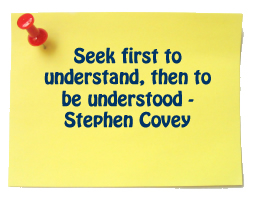- POPULAR ARTICLES
- Thank You Words
- Retirement Wishes
- Face to Face
Overcoming Communication Barriers
The very first step in overcoming communication barriers is to recognize who has built them.
You need to really look inside and see if you are the one that has erected the barriers. Fortunately, if you're the one who's making the barriers, you'll find overcoming them much easier.
If it is indeed you who built the barriers, here are some pointers in bringing them down: Pay attention, be present, be mindful of what is going on around you. Practice some mindfulness exercises to help you clear your mind of busy thinking and internal dialogue.
If you make only one change in your communication practice, endeavor to become more conscious of what you and others are saying and doing during a conversation.
Of course, it could be the other person. You may be thinking: "On my end everything is kosher, I'm a good communicator, I pay attention, I'm present, I listen, etc. It's the other person that has built a barrier that I can't get through".
If others have built the barriers, things get a bit more difficult. When you try to get through those barriers, you're essentially trying to change someone else, and we all know how well that can go.
There is still hope, however, even if it is the other person that has built the barriers.
One possibility is that the person is not listening to you. You can start by asking the person to tell you what they understood. By getting in the habit of asking him/her what they understood, they'll pay more attention the next time you speak, since they will anticipate your usual: "What did you understand about what I just said?"
You may get on people’s nerves doing this, but if the relationship is worth it, then it’s worth  the trouble. Explain what you are doing, tell them you are just trying to improve the clarity of your communication.
the trouble. Explain what you are doing, tell them you are just trying to improve the clarity of your communication.
Another possibility is that the other person is holding on to a point of view that is different than yours. Right or wrong, they may be trying to convince you or their truth. It's unlikely they will listen to anything you have to say until they know with certainty that you have heard them. At this point, you could have (not just show) curiosity about the other person's point of view. You don't have to agree with what they are saying, but you could at least understand it.
Of course, you don't have to do any of these things, you could just sit back and blame the other person for the communication breakdown. But what does that get you? Any satisfaction you may get out of being right will fade in the face of the distancing you will experience with the other person, especially if it's someone that really matters to you.
Related article: Barriers to Effective Communication




